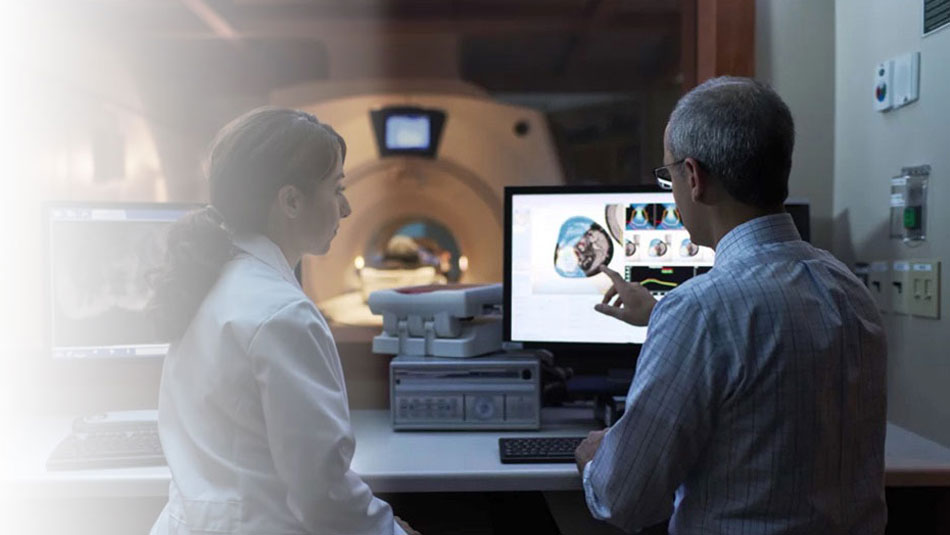Minimally Invasive MRI-Guided Interventional Care

Leaders in Minimally Invasive MRI-Guided Interventional Care
Our radiologists in the Minimally Invasive MR Interventional Center (MIMRIC) lead the way in using magnetic resonance imaging (MRI) for targeted, personalized treatment of a wide variety of conditions. These techniques bring precision, generally leading to faster recovery with less discomfort and fewer complications than open surgery.
Whether you are a patient or a referring physician, our MIMRIC team looks forward to serving you.
WHAT WE OFFER YOU FOR MINIMALLY INVASIVE MRI-GUIDED INTERVENTIONAL CARE
- Nationally recognized expertise in radiology, with a dedicated team of specialists trained in using MRI to diagnose conditions and precisely guide treatment procedures.
- Advanced, minimally invasive test and treatment approaches, including MRI-guided biopsy, MRI-guided high-intensity focused ultrasound (HIFU), and MRI-guided cryoablation, to provide expert care for a wide range of conditions.
- Preventive screening and thorough evaluations for your health, comfort, and peace of mind.
- Multidisciplinary team-based approach that brings together experts from oncology, urology, neurosurgery, gynecology, and more to provide care personalized to each patient’s needs.
- Extensive support services such as pain management, patient and caregiver support groups, and physical therapy to help you have the best quality of life possible.
- Access to Clinical Trials for innovative treatments developed by our doctors in the Minimally Invasive MR Interventional Center (MIMRIC) addressing various conditions.
Our Approach to Minimally Invasive MRI-Guided Interventional Care
Stanford Health Care’s Minimally Invasive MR Interventional Center (MIMRIC) team offers MRI-guided interventional care as a nonsurgical way to treat conditions like essential tremor or Parkinson's related tremor, bone cancer, uterine fibroids, and prostate cancer. Our highly trained radiologists work closely with neurosurgeons, oncologists, women’s health doctors, and other specialists. Using advances in magnetic resonance imaging (MRI), many developed at Stanford Health Care, we precisely view tumors, nerves, blood vessels, and other structures in the body. This technology helps guide treatment personalized to your needs and is designed to relieve symptoms while leaving healthy tissues undamaged. Our MRI-guided procedures offer many advantages, including potentially faster recovery times.
What is Minimally Invasive MRI-Guided Interventional Care
Minimally Invasive MRI-Guided Interventional Care
MIMRIC involves the use of magnetic resonance imaging (MRI) to nonsurgically treat conditions such as bone cancer, uterine fibroids, and Parkinson’s disease-related tremors.
Biopsy
bone metastases
cancer
cryoablation
cryotherapy
desmoid fibromatosis
Desmoid tumors
essential tremor
hysterectomy
liver cancer
liver tumors
lymphangiography
magnetic resonance guided focused ultrasound
magnetic resonance imaging
MRgFUS
MRgHIFU
MR-guided biopsy
MR-guided cryoablation
MR-guided liver biopsy
MR-guided prostate biopsy
MR-guided prostate cryoablation
MR-guided renal biopsy
MR-guided soft tissue biopsy
MRI
MRI-guided focused ultrasound
MRI-guided high-intensity focused ultrasound
MR-lymphangiogram
MR-lymphangiography
osteoblastic tumors
osteoid osteomas
Parkinson’s disease
Parkinson’s disease-related tremors
prostate cancer
prostate cancer biopsy
soft tissue metastases
soft tissue tumors
uterine fibroids
vascular malformations

